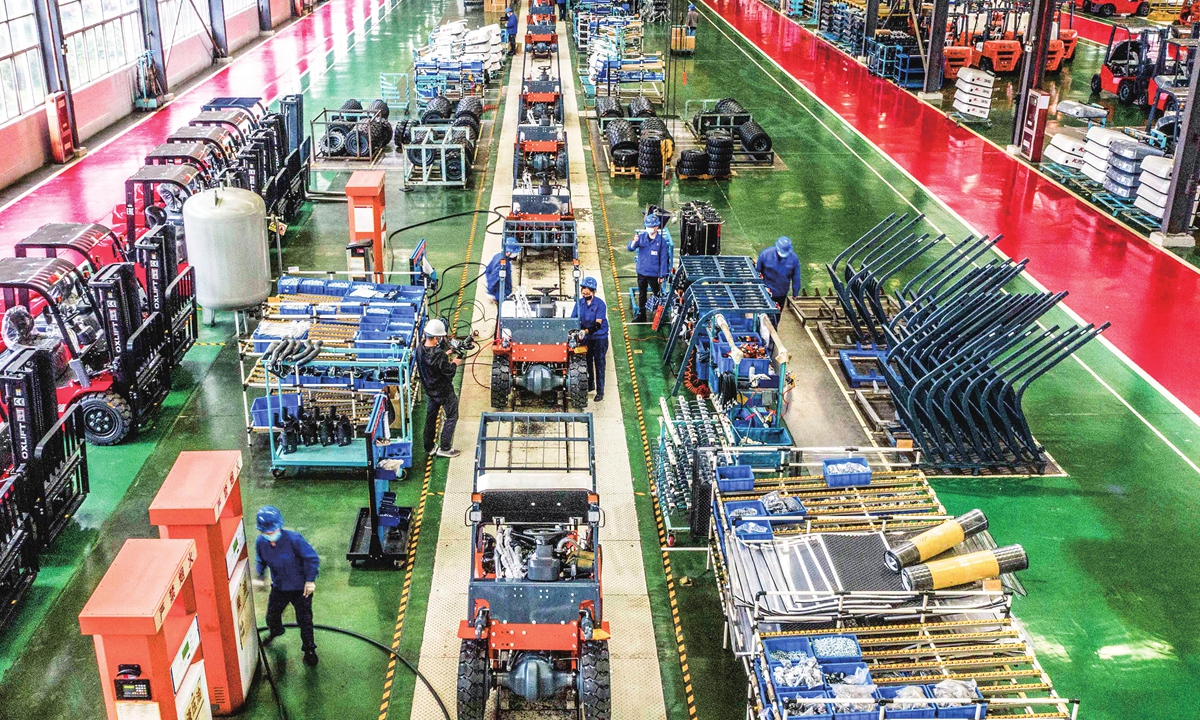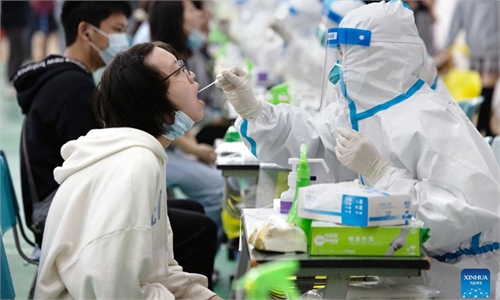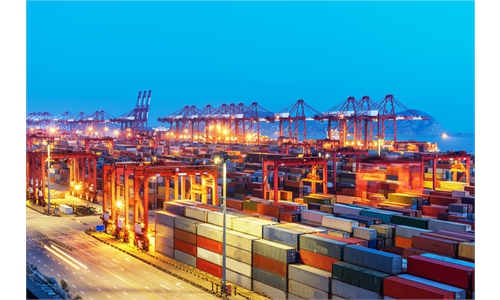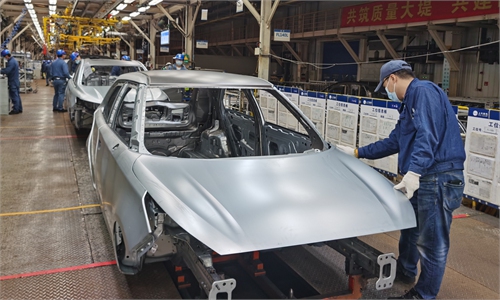Bright spots seen in China’s future economic growth in investment, consumption, new infrastructure

Staffers work at a smart assembly line in a forklift company in Hefei, East China's Anhui Province on April 13, 2022. Cities are trying to balance production and epidemic prevention to ensure stable economic development. Photo: cnsphoto
From two of China's major economic engines investment and consumption, to nascent growth points like pre-made food and China's relentless efforts to conduct reforms, economists observed multiple bright spots in China's economic growth momentum for the remaining months of 2022, despite economic woes from unexpected challenges including the COVID flare-ups in Shanghai and the Ukraine crisis.
They express confidence for the country's prospects of achieving the yearly GDP growth target of 5.5 percent, as the recent rollout of supporting policies, whether micro or macro, monetary or fiscal, is gradually starting to take effect in multiple economic areas.
The confidence showed by domestic economists is also a steadfast rebuttal of many overseas analysts, who have expressed some sort of appreciation over China's economic performance in the first quarter, but would not be swayed from their bearish outlook on China's economic prospects.
China's hard-won steady start in the first quarter fully demonstrates unchanged continued recovery and unchanged economic fundamentals characterized by strong resilience, enormous potential and vitality, as well as long-term sustainability, Foreign Ministry Spokesperson Wang Wenbin said at a regular press briefing on Tuesday.
Facts "have proved and will continue to prove" that China... will effectively deal with risks and challenges to realize healthy and sustainable economic development and to inject more energy to world economic recovery, Wang stressed.
Coming to the more practical issue of whether China can achieve its GDP growth target for 2022, all economists interviewed by the Global Times voted yes, although some were not one hundred percent sure because of uncertainties in the development course of COVID.
Lian Ping, head of Zhixin Investment Research Institute told the Global Times that despite lingering shocks to the real economy in the second quarter, he is confident that the annual economic growth goal could be achieved, thanks to a policy mix including diverse monetary tools and fiscal support to boost stable growth and give relief.
Wang Peng, an assistant professor at the Gaoling School of Artificial Intelligence at the Renmin University of China told the Global Times that he thought the chances are above 80 percent that China could achieve the GDP target, as long as the domestic industrial chains and logistics system are not blocked amid COVID-fighting methods.
The economists stressed that China's economy is resilient because the country has always launched reforms in an orderly way, for example in scientific and systematic areas, despite external and domestic fluctuations.
China issued guidelines on establishing digital government and pushing fiscal system reforms under the provincial level on Tuesday, a report from China Central Television noted. The meeting stipulated that China should straighten out fiscal relations in local governments under provincial levels to make income division more standardized.
Major engines and bright spots
In general, economists summarized the country's economic momentum for the latter half of 2022 as "two engines," investment which plays a fundamental role in bolstering the economy and consumption, which has great chances of recovery after the COVID outbreak eases, as well as several bright spots like new infrastructure.
In particular, infrastructure investment will be the major fuel for economic stimulation as it is a "dead cert" for pumping economic output following the large-scale and ahead-of-schedule issuance of special bonds, Hu Qimu, chief research fellow at the Sinosteel Economic Research Institute, told the Global Times on Tuesday.
"The added value of the investment sector will be more evident in the second and third quarter, after China enters peak season for construction," he said.
There were signs of bright prospects in China's manufacturing investment in the economic data of the first quarter. In the first three months, China's secondary industry expanded 5.8 percent, faster than overall economic growth rate of 4.8 percent, which is seen by analysts as a sign of growing momentum.
"The upgrading and transformation of the country's manufacturing sector shows an outstanding performance in the first three months - an important positive signal of an upward macro-economy," Yu Miaojie, deputy dean of the National School of Development at Peking University, told the Global Times on Tuesday.
He noted that it embodies the timely introduction of macro-economic policies, especially fiscal ones.
Apart from investment, consumption, another major pillar of domestic economy is expected to play a positive role despite the short-term pressure it is facing, mostly because of the COVID situation in Shanghai, economists believe.
Hu said that the consumption sector has a lot of uncertainties, but given the coronavirus can be put under control, a retaliatory rebound in the sector is very likely in future quarters as domestic demand has not been severely battered.
"Given the adequate policy support which is already being rolled out, consumption growth won't be too bad for the whole year," Hu noted.
Some analysts also looked at new growth points in the consumption sector. Wang Peng, for example, said that COVID has nurtured some new consumption business models like pre-made food, live action role playing games and so on. The landing of large theme parks and transformation of commercial circles are also fueling growth in this sector, he said.
Besides, he noted that China's digital transformation, which accelerated the emergence of business models like new infrastructure, is also a focus and bright spot for 2022's economic development.
Supportive policies
To maintain China's economic growth target amid external pressures, the government has rolled out a number of policies ranging from general structural adjustment policies like setting up a unified market to more specific measures like reserve requirement ratio cuts and methods to facilitate loans after the Shanghai Omicron outbreak.
China's economic planner, the National Development and Reform Commission (NDRC) also noted on Tuesday that it would implement the previously launched policies to boost industrial growth and services industry recovery, as well as carry out employment priority policies and stabilize the supply of products vital to people's livelihood.
According to economists, all sectors rendered as China's future growth points have been given policy stimulation to ensure their growth.
For example, easing of monetary policies and bail-out measures for local dining, retail and other consumption related sectors would prevent people or businesses' economic status from collapsing in the near future, so they can spend readily once the COVID wanes, Hu said, adding that credit easing is a bonus for the property sector.
A similar situation is investment which is backed by timely issuance of special bonds. According to the Xinhua News Agency, by the end of March, China has released all the quota related to project construction among the 3.65-trillion-yuan local government special bond quota for 2022, which speeds up and expands investment.
Some analysts also called for policy stimulus in other areas like employment to guarantee economic growth.
"The top priority is stabilizing employment, and to achieve the goal, tax and fees cuts should be intensified with targeted measures to help micro and small businesses survive the headwinds," Cong Yi, a professor at the Tianjin University of Finance and Economics told the Global Times on Tuesday.
Yu said that accelerating the establishment of a unified domestic market featuring high efficiency, rules, fairness and openness is of crucial importance to promote high-quality development for the rest of the year.
"A large and complete domestic market is the greatest potential of the Chinese economy in the future, which will replace low labor costs to become China's new comparative advantage," he said.




